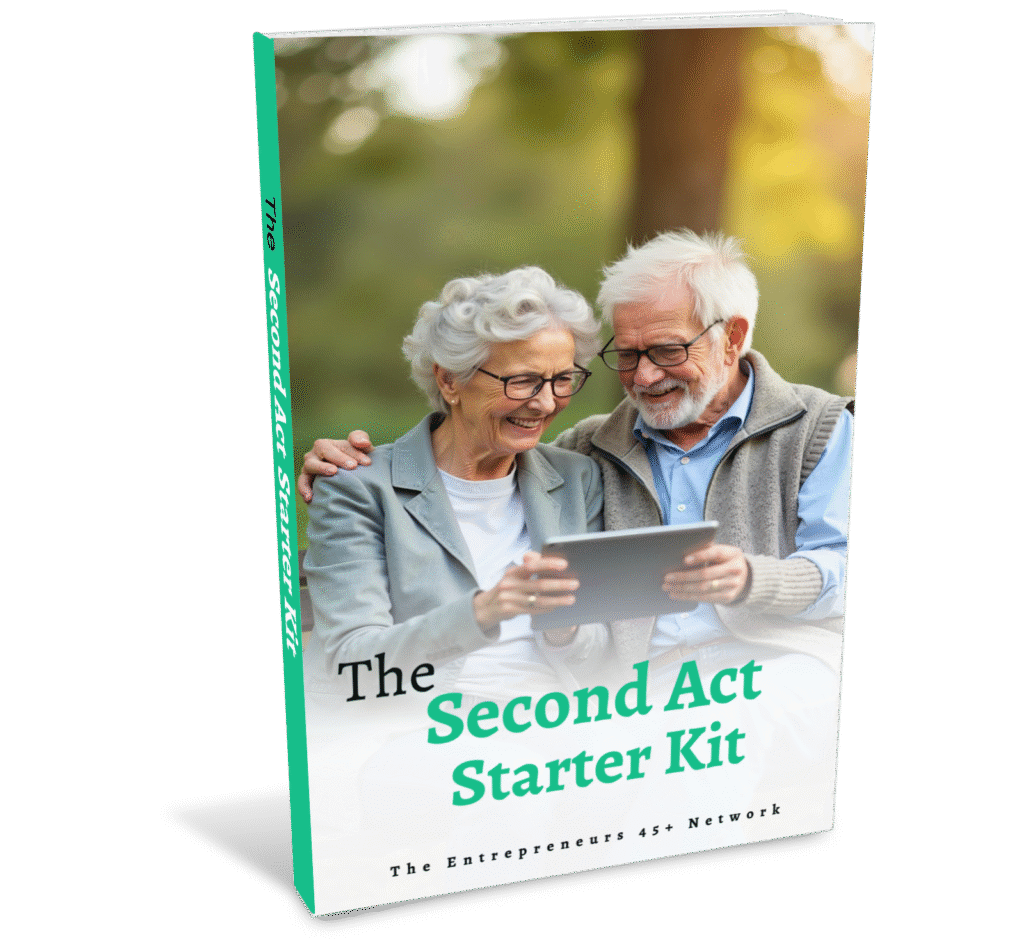The traditional retirement model has undergone a dramatic transformation in recent years. Remote work technologies, digital platforms, and the gig economy have created unprecedented opportunities for retirees to engage in meaningful work. Recent data shows that 72% of pre-retirees now plan to work in some capacity during retirement, with digital entrepreneurship becoming increasingly accessible to those with decades of professional experience.

Key Takeaways:
- Modern retirement is evolving into a transition period rather than a complete exit from work, with entrepreneurship becoming an attractive option for retirees seeking more control over their careers while maintaining their professional identity.
- Older entrepreneurs (50+) have shown higher success rates in business ventures compared to younger counterparts, with individuals aged 55-64 representing an increasing percentage of successful entrepreneurs from 1996 to 2016.
- Before starting a retirement business venture, individuals should carefully evaluate financial investments, assess personal risks, and ensure the chosen enterprise aligns with their enjoyment and well-being goals while consulting with professional advisors.

Redefining Productivity: Aging and Work Preferences
Your accumulated expertise and professional network can become valuable assets in retirement entrepreneurship. Research indicates that entrepreneurs over 55 have a 73% success rate in their ventures, largely due to their established industry connections and deep understanding of customer needs. The digital marketplace has opened new avenues for you to leverage your knowledge through consulting, online courses, or specialized services.
Modern retirement entrepreneurs are crafting work schedules that align with their desired lifestyle – often working 15-25 hours per week on projects they find personally fulfilling. This flexibility allows you to maintain professional engagement while preserving time for family, travel, and personal interests.
Breaking Free from Traditional Work Structures
The rise of digital platforms has eliminated many traditional barriers to entrepreneurship. You can now start a business with minimal overhead costs, often operating from home or shared workspaces. Online marketplaces, social media, and professional networking sites provide direct access to potential clients and partners, while automation tools handle many administrative tasks.
Your retirement business can take advantage of emerging trends like the sharing economy, subscription services, or specialized consulting. These models offer scalable income potential without requiring the intensive time commitment of traditional brick-and-mortar businesses.
The financial dynamics of retirement entrepreneurship have also evolved significantly. Many retirees are combining passive income streams from investments with active income from their businesses, creating a more resilient financial portfolio. This hybrid approach allows you to scale your business involvement up or down based on market conditions and personal preferences, providing greater control over your retirement journey.
Reinventing Retirement: The Rise of Entrepreneurial Spirit
Your generation stands at the forefront of redefining retirement through entrepreneurship. The traditional notion of retirement as a complete withdrawal from productive work has given way to a more dynamic approach where you can leverage decades of experience into fulfilling business ventures. Research shows that entrepreneurs over 50 bring unique advantages to their startups, including deeper industry knowledge, established professional networks, and greater financial resources.
Shifting Mindsets: Work as a Part of Life, Not the End
You’re part of a growing movement that views work not as something to escape from, but as an integral component of a well-rounded retirement lifestyle. Modern retirees like you increasingly seek meaningful engagement that combines income generation with personal fulfillment. The flexibility of entrepreneurship allows you to structure work around your desired lifestyle, rather than the other way around.
Your professional expertise, combined with the freedom to choose projects that align with your values, creates an ideal foundation for entrepreneurial success. Studies show that 82% of successful entrepreneurs are motivated by building something meaningful, rather than just financial gain – a mindset particularly prevalent among retiree entrepreneurs.
The Economic Context: Longevity Meets Opportunity
The digital economy has dramatically lowered barriers to entry for new businesses, making entrepreneurship more accessible than ever before. You can now start a consulting practice, online store, or service-based business with minimal upfront investment. The gig economy and remote work possibilities have created numerous opportunities for you to monetize your expertise without requiring significant capital investment.
Your timing for entrepreneurship couldn’t be better. The silver economy is projected to reach $15 trillion globally by 2050, creating abundant opportunities in sectors like healthcare technology, leisure services, and professional consulting. The combination of increased longevity and technological advancement has opened up new markets specifically suited to entrepreneurs with your level of experience.
The rise of multi-generational workplaces has also created unique opportunities for you to bridge experience gaps in various industries. Your ability to mentor younger professionals while building your own business represents a valuable market position that younger entrepreneurs simply cannot replicate. This advantage, coupled with your established professional network, provides a strong foundation for entrepreneurial success in your retirement years.
The Entrepreneurial Edge: Why Experience Matters
Decades of professional experience provide you with invaluable assets for entrepreneurial success – deep industry knowledge, extensive professional networks, and refined problem-solving skills. Your career has equipped you with pattern recognition abilities that help identify viable business opportunities and potential pitfalls before they materialize. These capabilities, combined with emotional maturity and tested leadership abilities, create a powerful foundation for launching and growing a successful venture.
Success Rates: Older Entrepreneurs vs. Younger Counterparts
The numbers tell a compelling story about entrepreneurial success after 50. Research from the Kauffman Foundation reveals that entrepreneurs over 55 have the highest success rates across all age groups, with 70% of their ventures lasting three years or more compared to 28% for younger entrepreneurs. Your professional experience translates directly into business acumen – you’ve likely managed budgets, led teams, and navigated complex organizational challenges throughout your career.
The Financial Benefits of Starting Later in Life
Starting a business after 50 often comes with significant financial advantages. You’ve likely accumulated substantial savings, built strong credit, and have access to more extensive funding options than younger entrepreneurs. This financial cushion allows you to make strategic decisions without the pressure of immediate profitability that often forces younger founders to compromise on their vision.
Your established professional network can also translate into early clients, strategic partnerships, and valuable mentorship opportunities. Industry connections built over decades provide immediate credibility and can significantly reduce customer acquisition costs. Additionally, your deeper understanding of market dynamics helps you identify profitable niches that younger entrepreneurs might overlook.
The Unique Advantages Older Entrepreneurs Bring
Your decades of professional experience and life wisdom position you uniquely for entrepreneurial success. The combination of established networks, deep industry knowledge, and refined decision-making abilities creates a powerful foundation for business ownership. Research shows that entrepreneurs over 50 are 2.2 times more likely to achieve high-growth success compared to those in their 30s, largely due to these accumulated advantages.
Financial Stability: Leveraging Past Investments
Your established financial position provides significant entrepreneurial advantages that younger business owners typically lack. With retirement accounts, investment portfolios, and potentially paid-off mortgages, you can approach business ownership from a position of strength. This financial cushion allows you to make calculated risks and weather early business challenges without jeopardizing your basic financial security.
The ability to self-fund initial business costs puts you ahead of many younger entrepreneurs who often struggle with startup capital. Your credit history and existing assets may also give you preferential access to business loans and better terms from vendors. This financial leverage allows you to focus on building the business rather than constantly chasing capital.
Experience Meets Resilience: Navigating Challenges Wisely
Your professional journey has equipped you with invaluable crisis management and problem-solving skills. Having weathered multiple economic cycles and industry changes, you bring pattern recognition abilities that help identify both opportunities and potential pitfalls. This experience allows you to navigate business challenges with a steady hand, avoiding common mistakes that often derail less seasoned entrepreneurs.
The professional network you’ve built over decades provides immediate access to potential clients, mentors, and business partners. Your ability to leverage these relationships can accelerate business growth and provide crucial support during challenging times. Additionally, your refined communication skills and emotional intelligence help in negotiating deals and managing stakeholder relationships effectively.
Your career experience has also taught you the value of work-life balance and sustainable business practices. Rather than burning out from 80-hour weeks, you can structure your venture to align with your desired lifestyle while still driving results. This wisdom in resource management – both personal and professional – creates a more sustainable path to entrepreneurial success.
Investment Calculations: Balancing Risk and Reward
Your accumulated wealth provides a strong foundation for entrepreneurial ventures, but requires careful allocation between business investment and retirement security. Market analysis shows successful retirement entrepreneurs typically invest 15-25% of their liquid assets into new ventures, maintaining substantial reserves for living expenses and emergencies. The “70-20-10 rule” often serves as a useful framework – keeping 70% in stable retirement accounts, 20% for business operations, and 10% as working capital.
The risk-reward equation takes on new dimensions when launching a business in retirement. Your established network and industry expertise can significantly reduce startup costs compared to younger entrepreneurs. Data from the Small Business Administration reveals that retiree-led startups require an average of 30% less initial capital while achieving profitability 18 months faster than the general average.
Financial Planning for Aspiring Entrepreneurs
Your business funding strategy should align seamlessly with your retirement income plan. Consider creating separate “buckets” for personal expenses, business operations, and growth capital. Many successful retirement entrepreneurs maintain 24-36 months of living expenses in low-risk investments before directing funds toward business development.
Tax-efficient structuring becomes particularly relevant at this stage. Strategic use of self-directed IRAs, solo 401(k)s, or other retirement accounts can provide business funding while preserving tax advantages. However, these approaches require careful navigation of IRS regulations to avoid penalties or unintended tax consequences.
Legal Considerations and Protections
Business structure selection carries heightened significance when protecting retirement assets. While sole proprietorships offer simplicity, incorporating as an LLC or S-corporation creates a vital barrier between personal and business liabilities. Your decades of accumulated assets demand comprehensive protection through appropriate business insurance coverage, including general liability, professional liability, and cyber security policies.
Estate planning integration becomes imperative when launching a retirement business venture. Clear succession plans, buy-sell agreements, and updated estate documents ensure your entrepreneurial legacy aligns with your broader wealth transfer goals. Regular reviews with legal counsel help maintain appropriate protections as your business evolves.
Assessing the Financial Landscape: Investing in Your Dreams
Your retirement savings represent decades of disciplined financial planning and careful investment decisions. Starting a business venture requires balancing entrepreneurial ambitions with protecting the nest egg you’ve built. The financial commitment needed varies dramatically – from minimal investment for consulting or online businesses to substantial capital for brick-and-mortar establishments or franchises. Understanding your risk tolerance and available capital helps narrow down viable business models aligned with your financial position.
Risk Evaluation: How Much Should You Invest?
Start by determining your “venture capital” – the amount you can invest without jeopardizing your core retirement plan. Industry statistics show successful retiree entrepreneurs typically limit initial investments to 10-15% of their liquid assets. This approach maintains sufficient reserves while providing adequate startup funding. Your existing retirement accounts, including IRAs and 401(k)s, can potentially be leveraged through specialized business funding programs designed for older entrepreneurs.
The funding strategy should match your business model’s needs. Service-based businesses focusing on your professional expertise may require minimal upfront costs beyond basic equipment and marketing. However, inventory-heavy retail operations or franchise opportunities often demand six-figure investments. Carefully evaluate whether traditional loans, self-funding, or investor partnerships best serve your financial circumstances.
Financial Advisors: Your Strategic Partners in Planning
Professional financial guidance becomes especially valuable when transitioning from employee to entrepreneur. Your advisor can help structure the business to optimize tax advantages, protect personal assets, and maintain steady retirement income streams. They’ll analyze how various funding options impact your overall financial health and recommend appropriate insurance and legal protections.
Beyond the initial planning, regular meetings with your financial advisor help monitor business performance against retirement goals. They can identify early warning signs if the venture starts impacting your long-term security and suggest course corrections. This ongoing partnership provides an objective perspective on balancing business growth with preserving your retirement lifestyle.
Working with advisors who specialize in retirement entrepreneurship gives you access to extensive networks and resources. They can connect you with peer groups, industry experts, and other professionals who understand the unique challenges of starting businesses later in life. These connections often prove invaluable for navigating regulatory requirements, accessing capital, and developing sustainable business strategies.

The Joy Factor: Finding Fulfillment in Your Endeavors
Crafting a Business that Brings Pleasure, Not Pressure
Your entrepreneurial venture should align naturally with your passions and expertise, creating a seamless blend between work and enjoyment. Many successful retiree entrepreneurs have transformed their longtime hobbies or professional skills into thriving businesses – from consulting in their former industry to opening specialty boutiques based on personal interests. The key lies in selecting an enterprise that energizes you daily, rather than depleting your enthusiasm.
By structuring your business around your preferred lifestyle, you can maintain the flexibility to travel, spend time with family, or pursue other interests while generating income. Consider starting small and scaling gradually – perhaps beginning with a few select clients or limited operating hours. This approach allows you to test your business concept while preserving the work-life balance that makes retirement entrepreneurship appealing.
Social Engagement and Community Building in Business
Running your own business creates natural opportunities for meaningful social connections and community involvement. Whether mentoring younger entrepreneurs, collaborating with other local business owners, or serving customers directly, your venture can become a hub for relationship building. Many retiree entrepreneurs report that these social aspects become the most rewarding part of their business journey.
Your years of professional experience position you perfectly to become a valued member of local business networks and industry associations. Through these connections, you can share knowledge, find potential partners, and create mutually beneficial relationships that extend beyond pure business transactions.
The social dimension of entrepreneurship also provides cognitive benefits – engaging regularly with customers, vendors, and business peers helps maintain mental sharpness and creates a sense of purpose. Studies show that retirees who maintain strong social connections through business activities report higher levels of life satisfaction and better overall health outcomes compared to those who fully retire from professional life.
Mitigating Risks: Protecting Your Personal Assets
Starting a business in retirement requires careful consideration of asset protection strategies to safeguard your wealth. While many retirees wonder if entrepreneurship can lead to an early retirement, the focus should be on protecting existing assets while growing your venture. Your decades of accumulated wealth shouldn’t be put at risk by your new business endeavors.
Business Structures Explained: LLC vs. Corporation
Limited Liability Companies (LLCs) offer an excellent balance of asset protection and operational flexibility for retiree entrepreneurs. The LLC structure creates a legal separation between your personal and business assets, meaning your retirement accounts, home, and other personal property remain protected if your business faces legal challenges. You’ll maintain management control while benefiting from pass-through taxation, avoiding the double taxation that corporations face.
Corporations provide the strongest liability protection but come with more complex requirements and costs. S-corporations can be advantageous for retiree business owners who want to minimize self-employment taxes by drawing both a reasonable salary and dividends. Your specific situation, including projected revenue, number of employees, and growth plans will determine the optimal structure.
Insurance Essentials: Safeguarding Your Personal Estate
Beyond legal structures, comprehensive insurance coverage forms your second line of defense. Professional liability insurance protects against claims of negligence or failure to deliver promised services. General liability coverage guards against third-party injuries or property damage. Business interruption insurance can provide income if your operations are temporarily halted.
Your existing personal insurance policies likely won’t cover business activities, creating dangerous gaps in protection. A Business Owner’s Policy (BOP) bundles key coverages at a lower cost than purchasing them separately. Consider additional riders for specific risks in your industry – whether that’s cyber liability for an online business or product liability for retail ventures.
Navigating Potential Pitfalls: Wisdom is Key
Your decades of experience provide valuable insight for spotting and avoiding common business pitfalls. Before launching your venture, take time to thoroughly assess market conditions, competitive landscape, and financial requirements. Should You Start a Business in Retirement? This evaluation phase helps you determine if your business concept aligns with both market needs and your personal goals. Many retiree entrepreneurs find success by starting small and scaling gradually, allowing them to test their business model without risking significant capital.
Common Mistakes to Avoid as a New Entrepreneur
Underestimating startup costs and overestimating initial revenue represent two frequent missteps among new business owners. Your business plan should account for at least 12-18 months of operating expenses, including marketing, insurance, and necessary licenses. Another common error involves trying to do everything alone – successful entrepreneurs recognize when to delegate tasks or seek professional guidance.
Failing to establish clear boundaries between personal and business finances can create both tax complications and risk exposure. Set up separate business accounts and maintain meticulous records from day one. Additionally, avoid the temptation to expand too quickly – steady, sustainable growth typically yields better long-term results than rapid expansion.
Leveraging Personal Networks and Resources
Your professional network represents one of your strongest assets as a retiree entrepreneur. Former colleagues, industry contacts, and professional associations can provide valuable leads, partnerships, and mentorship opportunities. Consider joining entrepreneur groups specifically focused on retirement-age business owners to connect with peers facing similar challenges and opportunities.
Local business development centers, SCORE mentorship programs, and industry-specific organizations offer resources tailored to your needs. These connections can help you navigate regulatory requirements, access funding options, and develop strategic partnerships while avoiding costly mistakes that often plague new entrepreneurs.

Balancing Work and Joy: Finding Fulfillment in Entrepreneurship
Your entrepreneurial journey during retirement opens doors to both professional satisfaction and personal enjoyment. Many retirees discover that entrepreneurship can reshape their retirement timeline, allowing them to build wealth while pursuing meaningful work. The key lies in creating a business model that aligns with your desired lifestyle – one that provides flexibility to travel, spend time with family, or pursue other interests while maintaining a steady income stream.
Passion Projects: Turning Hobbies into Revenue Streams
Your years of experience likely include hobbies and interests that can transform into profitable ventures. Whether you’re skilled at woodworking, photography, consulting, or teaching, these passion projects often become the foundation for successful retirement businesses. Statistics show that 82% of successful entrepreneurs build businesses around their existing skills and interests, leading to higher satisfaction rates and longer-term sustainability.
The digital marketplace has made it easier than ever to monetize your expertise. You can create online courses, start a YouTube channel, launch a consulting practice, or sell handcrafted items through e-commerce platforms – all while maintaining control over your schedule and workload. These ventures often require minimal startup capital while leveraging the knowledge you’ve accumulated throughout your career.
The Importance of Work-Life Enjoyment: Making Retirement Engaging
Your retirement business should enhance, not dominate, your lifestyle. Successful retirement entrepreneurs typically work 15-25 hours per week, leaving ample time for other activities. This balanced approach allows you to maintain professional engagement while enjoying the freedom that retirement offers. Studies show that retirees who maintain purposeful work activities report higher levels of life satisfaction and better mental health outcomes.
The entrepreneurial path offers unique opportunities to create a retirement that’s both financially rewarding and personally fulfilling. By focusing on projects that energize and inspire you, while setting clear boundaries around work commitments, you can build a sustainable business model that supports your ideal retirement lifestyle. This approach helps maintain cognitive function, social connections, and a sense of purpose – all vital components of a satisfying retirement.
Final Words
With this in mind, your journey into entrepreneurship during retirement can be both rewarding and sustainable when you approach it with careful planning and realistic expectations. By leveraging your decades of experience, professional networks, and financial stability, you’re actually better positioned than younger entrepreneurs to create a successful business venture that aligns with your retirement lifestyle goals. Your ability to balance risk with reward, combined with your deep understanding of your industry, gives you a significant advantage in the entrepreneurial landscape.
As you launch on this exciting new chapter, your focus should remain on creating a business that not only provides financial benefits but also delivers personal satisfaction and maintains your desired work-life balance. By working closely with your financial advisors and carefully structuring your business to protect your retirement assets, you can build an enterprise that enhances your retirement years while preserving the financial security you’ve worked so hard to achieve.
Summing up
Ultimately, your journey into entrepreneurship during retirement can offer you an exciting blend of professional fulfillment and personal freedom. You have unique advantages as a mature entrepreneur – your wealth of experience, established networks, and financial stability position you strongly for success. When you combine these assets with your ability to choose work that aligns with your passions and desired lifestyle, you’re well-equipped to create a thriving post-retirement business venture.
Your entrepreneurial path in retirement allows you to write your own rules while maintaining the professional identity you’ve built over decades. By carefully considering your financial boundaries, managing potential risks, and focusing on activities that bring you joy, you can create a business that not only generates income but also enriches your retirement experience. As you step into this new chapter, your accumulated wisdom becomes your greatest asset in building a successful enterprise that fits your ideal retirement lifestyle.



